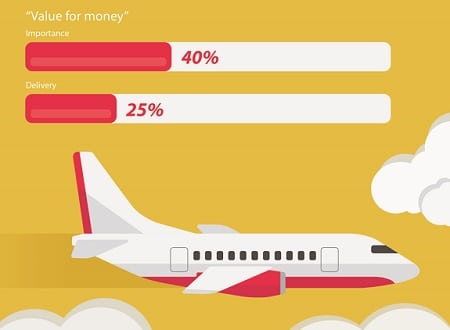
The study, conducted by the DMA, with partners Emarsys, Epsilon, Feefo and Wiraya found that consumers want value for money, as well as ease of use and good customer service.
When booking a holiday, two thirds of customer chose to book online, with a fifth deciding to book over the phone and the same proportion preferring in person through a travel agent. However, travel brands aren’t delivering fully on consumer demands. Customers simply want to feel more like brands ‘Do not lie to me’, with a 19% difference for airlines, 18% for online booking sites and 18% for accommodation brands.
Going beyond this, customers highlighted areas for airlines to improve upon being customer service and value for money (both 15% difference). For online booking sites, these areas are not lying to them (15% difference) and value for money (13%). Meanwhile, for accommodation brands these are doing business fairly (16% difference) and being genuine (15%).
The top reasons consumers remained loyal to brands in the sector repeat similar themes of good service experience (53%) and good deals (40%), with the addition of a good loyalty or a rewards scheme (40%) to the top three.
Rachel Aldighieri, MD at the DMA, said: “Holiday travel is both an exciting and stressful experience, with the chance for distrust and caution to arise in the customer’s mind. Brands that can empathise with customers’ needs at whatever stage of their holiday journey and create communications that reflect their needs will have the potential to build stronger relationships in the long run.”
Exceptional service helps keep travel customers loyal, with four in 10 saying they choose ‘friendly and welcoming’ hotels. In addition, rewards further cement loyalty, with 42% would stick with an airline because of a loyalty scheme.
Over half of consumers (52%) are willing to use a chatbot to help with pre-travel or booking questions, such as asking an airline for flight details. Augmented and virtual reality presents a new potential channel for travel brands to engage customers too, with more than half (53%) interested in using a virtual reality headset to see a hotel room they are considering staying in.
Once in the airport, 51% of consumers would also be open to sharing their data in order to receive mobile alerts about boarding directions and timings when in an airport. In addition, 44% would like to use augmented reality to get information about the sites or attractions they visit.
Ultimately, from meeting customer demands on function and ethics, to adopting overt loyalty schemes, to embracing the latest technologies, travel brands have the opportunity to connect with their audience like never before. Marketers need to communicate these values of good ethics, customer rewards and technological innovation in their campaigns – while meeting the high functional demands of consumers in this emotionally-charged sector.

To read more about the DMA’s Customer Engagement research into the Travel sector, including the full report, visit: https://dma.org.uk/customer-engagement
http://dma.org.uk/the-dma-code
